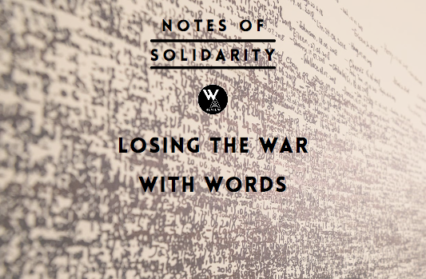Notes of Solidarity is a new daily series of mini-essays, poems, and reflections on the Russian war on Ukraine by some of Wales’s leading literary figures. Here, author James Stafford writes on the difficulty and shame inflicted in being unable to find the right words in the face of tragedy and language barriers.
As a writer you hope to have words for any situation. Others certainly expect you to.
But sometimes they just don’t come. Or they do, but fall so short of accurately relaying what’s happening in your head you feel you may as well have not even picked up a pen in the first place.
Like most people, I have found the war in Ukraine sickening. And like most people, writers or not, I’ve struggled to express my horror, anger, fear and concern. The fact I feel helpless to do anything practical about the war itself other than make donations, offer goods to humanitarian causes or generate noise on social media, only compounds my frustration at my struggle with words. Words are supposed to be my friend.
The war has revealed my inadequacy to find the right words in not one, but two languages. I live in Prague and study the Czech language. I am far from an accomplished student. The shame and fear I felt as a schoolboy learner unable to grasp Welsh or French has never gone away. This, combined with my poor ability to retain what I have learnt means, at best, I can occasionally attain what is known as B1 level on the European language framework.
A small personal link I have to Ukraine has brought my deficiencies home to me recently. Around a decade ago I made a Ukrainian friend on a Czech language course in Prague. To be quite blunt, she possessed vastly superior Czech skills to mine.
Our conversations involved tortuous attempts on my side to get at least something resembling the right words out (with hopefully some vaguely recognisable pronunciation) while, with the patience of a saint, she responded in as simple a way as she could to allow us to continue the conversation. I felt like a primary school pupil hanging out with an Oxford undergraduate. Despite my mangled phrases and mixed tenses, it was a classic example of how learning another language can bring you closer to people you otherwise could not communicate with, opening up shared human experiences and insight into other cultures.
Over the years, my friend and I kept in touch occasionally. Like many global friendships in the digital age, a year or more may go by with social media emojis, likes and endorsements of reshared Instagram stories the only interaction — a mutual, but vague hope of meeting again one day always in the background.
When war began my thoughts turned to my friend, now stuck in her homeland with a young daughter and a husband who cannot leave as he must stay to help the resistance.
Apart from the usual impotence you feel upon discovering a friend is in a terrible situation in which there is little you can realistically do to help them, I also had to again face my inability to find the right words to even convey my support or my feelings. There she was telling me the horrendous life-changing decisions her family were having to make, and there I was having to keep reaching for the dictionary to even reply, let alone express my emotions.
I find myself increasingly angry at myself for neglecting my language learning over the years. It’s not just the words I’m struggling with as I often do in English. But the grammar. The syntax. The tone. The punctuation.
My indiscipline in maintaining my language skills has left me at times, quite literally, without words. And I am ashamed. Just as I am ashamed at my inability to help my friend in any meaningful way. Words are tools of peace, of friendship and of war. I am struggling to find the right ones for all these things in two languages. To my friend in Ukraine, I am sorry. Já nemám slov.
For more information on the Russia-Ukraine war, including ways you can help, please click here.
You can follow all contributions to Notes of Solidarity from Wales Arts Review here.











